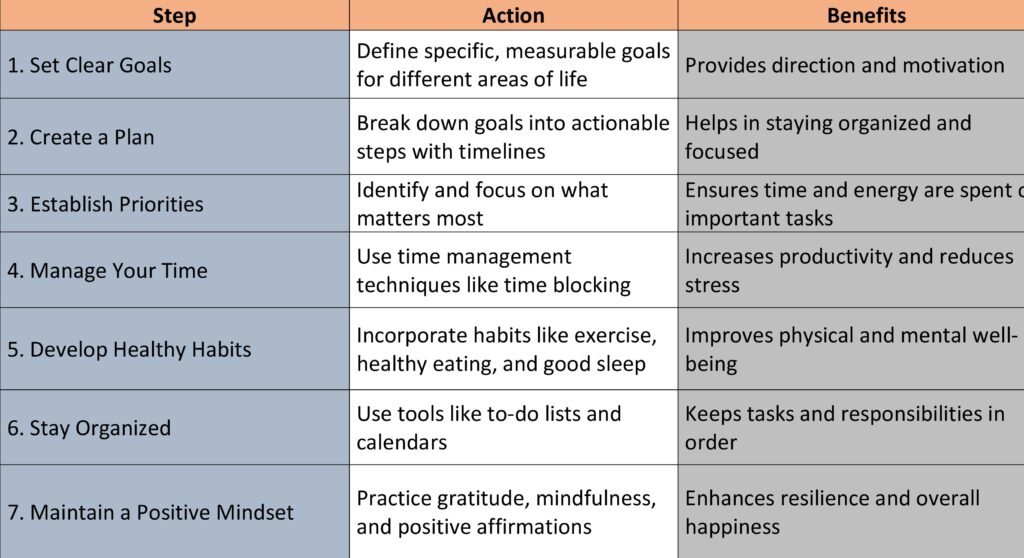Introduction
Did you know that over 70% of people feel they lack control over their lives? In a world filled with distractions and demands, many struggle to thrive instead of merely surviving. But what if you could flip the script? What if you could take control of your life and steer it toward fulfillment and success? Let’s explore how!
HOW TO TAKE CONTROL OF YOUR LIFE
Scientific Data on Life Control and Mental Well-being
Feeling in control of your life isn’t just a nice-to-have; it’s crucial for your mental well-being. Studies show individuals who perceive greater control over their lives generally experience higher happiness and lower stress. Research published in the Journal of Personality and Social Psychology links a sense of control to reduced levels of anxiety and depression.
The Importance of Control in Mental Well-being
Take control of your life to significantly improve your mental health. Control reduces uncertainty and enhances your sense of security. Psychologist Viktor Frankl, a Holocaust survivor, emphasized the importance of finding meaning and control in life. He argued that even in dire circumstances, achieving some level of control leads to inner strength and resilience.
Viktor Frankl’s Experience and Philosophy
Renowned psychiatrist Viktor Frankl offers profound insights into the human experience through his philosophy. He teaches us that while we can’t control every aspect of life, we can control our responses and find meaning in our experiences. This mindset shift is crucial for taking control and navigating life’s complexities. By adopting a proactive approach, we learn to view challenges as opportunities for growth and self-discovery. Embracing this perspective cultivates resilience, enabling us to thrive even in adversity. Each experience, whether positive or negative, contributes to personal development if we interpret it through meaning and purpose.
Assessing Your Current Life Situation
Self-Assessment Table
Before taking control, understand your current situation. A self-assessment table helps you evaluate various aspects of your life, such as career, relationships, and health. Rate each aspect on a scale from 1 to 10, and identify areas needing improvement.
How to Gain Control Using SWOT Analysis
A SWOT analysis (Strengths, Weaknesses, Opportunities, Threats) serves as a powerful personal assessment tool. Identify your strengths and weaknesses, and explore opportunities and threats in your current situation.
Conducting a Personal SWOT Analysis
If you find your career a weak point, consider opportunities for professional development or networking. Understanding your current situation allows you to make informed decisions about where to focus your efforts.
Setting Clear, Achievable Goals
The SMART Goals Framework
Use the SMART goals framework to set clear and achievable goals. SMART stands for Specific, Measurable, Achievable, Relevant, and Time-bound. A study by the Dominican University of California reveals that people who write down their goals are 42% more likely to achieve them.
Benefits of Setting SMART Goals
Setting SMART goals helps you focus your efforts and measure progress. For instance, instead of saying, “I want to get fit,” you could say, “I will run 3 miles, three times a week for the next three months.”
Example of Elon Musk’s Goal-Setting Strategies
Elon Musk, the visionary behind Tesla and SpaceX, exemplifies ambitious yet achievable goal-setting. He sets specific, measurable targets and regularly reviews progress. This disciplined approach enables him to achieve groundbreaking success.
Developing Effective Time Management Skills
The Impact of Time Management on Productivity
Effective time management empowers you to take control of your life and achieve personal and professional goals. The American Psychological Association reports that good time management can boost productivity by up to 25%, significantly enhancing your daily accomplishments. By allocating time wisely and prioritizing tasks, you can focus on what truly matters, reduce stress, and improve your overall quality of life. This skill benefits your work while allowing time for leisure activities, family, and self-care.
Time Management Techniques
Several effective time management techniques maximize your productivity and efficiency. One popular method, time blocking, involves scheduling specific time slots for various tasks throughout the day. This structured approach prevents distractions and ensures focused time for each activity. Another technique, the Pomodoro technique, breaks work into 25-minute intervals followed by short breaks, encouraging sustained focus and combating fatigue. Experiment with different techniques to find the best fit for your individual needs.
Weekly Planner Template
Using a weekly planner template effectively organizes your tasks and prioritizes activities. This simple yet powerful tool enables you to visualize the week ahead, align commitments with goals, and allocate time for both work and personal life. To maximize your planner, include sections for goals, urgent tasks, and time for relaxation or hobbies. Regularly review and adjust your planning to ensure consistent progress toward your objectives, bolstering your motivation.
Building Healthy Habits and Routines
The Science Behind Habit Formation
Building healthy habits ensures long-term success and well-being. Research shows that habits form through the creation of neural pathways in the brain. As you repeatedly engage in a behavior, these pathways strengthen, making it easier to maintain the habit over time. Understanding habit formation empowers you to make conscious choices that align with your health goals. Recognizing triggers that lead to negative behaviors allows you to replace them with positive ones, fostering lasting change.
Steps to Build Healthy Habits
To effectively build healthy habits, start small and remain consistent. Set manageable goals to prevent overwhelm and maintain motivation. Use triggers or cues to remind yourself of the new behavior you want to adopt. For instance, if you aim to exercise regularly, begin with short workouts—such as a 10-minute walk—and gradually increase the duration as your fitness improves. Establish a routine that seamlessly integrates these habits into your daily life. Celebrate small wins to keep yourself motivated and accountable.
Example of Tony Robbins’ Daily Routine
Tony Robbins, a renowned motivational speaker and life coach, incorporates healthy habits into his daily routine to maintain energy and focus. His morning ritual combines physical exercise, meditation, and goal-setting, setting a positive tone for the day. Robbins emphasizes starting each day with intention, including activities such as gratitude journaling, visualizing success, or engaging in movement to energize both body and mind. By sharing his daily practices, Robbins inspires others to cultivate their own routines that foster well-being and resilience.
Managing Stress and Building Resilience
The Impact of Stress on Health and Productivity
Stress significantly affects your health and productivity, impacting everything from your mood to your physical well-being. The American Institute of Stress reports that chronic stress can lead to various health problems, including heart disease, depression, and anxiety disorders. Effectively managing stress is crucial for taking control of your life and maintaining balance in the face of challenges. By developing healthy coping mechanisms, you improve not only your mental health but also your overall quality of life.
Stress Management Techniques
Incorporate several effective stress management techniques into your routine. Mindfulness meditation, for example, helps you stay present and focused, reducing anxiety and promoting relaxation. Practice mindfulness through simple techniques such as deep breathing exercises or guided meditation sessions. Additionally, cognitive-behavioral techniques assist you in reframing negative thoughts, enabling you to view situations from a balanced perspective. Engage in regular physical activity, maintain a healthy diet, and foster social connections to strengthen your stress management efforts. Proactively managing stress builds resilience and enhances your ability to navigate life’s ups and downs with confidence.
How To Take Control of Your Life Action Plan

Seeking Inspiration from Successful Individuals
Oprah Winfrey’s Journey to Personal Empowerment
Oprah Winfrey’s story showcases the power of resilience and personal empowerment. Despite facing numerous adversities, Oprah pursued education relentlessly and built a media empire. Her journey inspires millions to take control of their lives and strive for greatness.
J.K. Rowling’s Resilience and Success
J.K. Rowling’s transformation from a struggling single mother to a best-selling author exemplifies resilience. Despite many rejections, Rowling continued writing and eventually published the “Harry Potter” series, which became a global phenomenon.
Key Takeaways from Successful Individuals
Successful individuals like Oprah and Rowling highlight the importance of setting clear goals, maintaining resilience, and seeking continuous self-improvement. Their stories remind us that we can take control of our lives, regardless of the challenges we encounter.
FAQs about Taking Control of Your Life
1. What are the first steps to take control over my life?
Start with self-reflection to identify areas that feel out of control. Establish clear goals, prioritize tasks, and create a structured plan to achieve these goals. Implementing small, manageable changes leads to significant improvements over time.
2. How can I effectively manage my time to enhance productivity?
Use tools like calendars or planners to organize your tasks. Break your day into focused work intervals, such as the Pomodoro technique, and include short breaks. Prioritize tasks based on urgency and importance, and allocate specific time slots for each.
3. What are some practical ways to build and maintain motivation?
Celebrate small achievements, surround yourself with supportive people, and keep visible reminders of your goals to build motivation. Regularly review your progress and adjust your approach to maintain a positive mindset.
4. How do I handle setbacks while trying to take control of my life?
View setbacks as natural parts of your journey and opportunities for growth. Reflect on what went wrong, learn from it, and adjust your plan. Develop resilience through positive self-talk and seek support from others to navigate challenges effectively.
Conclusion
Taking control of your life represents a journey, not a destination. Understand the importance of control, assess your current situation, set clear goals, manage your time effectively, build healthy habits, and manage stress to unlock your full potential.
Remember, the first step toward taking control of your life holds the most significance. Implement the techniques and strategies outlined in this article to commence your journey today. Share your goals and progress with us in the comments or on social media. We’d love to hear from you and support you on your path to personal growth and empowerment.


